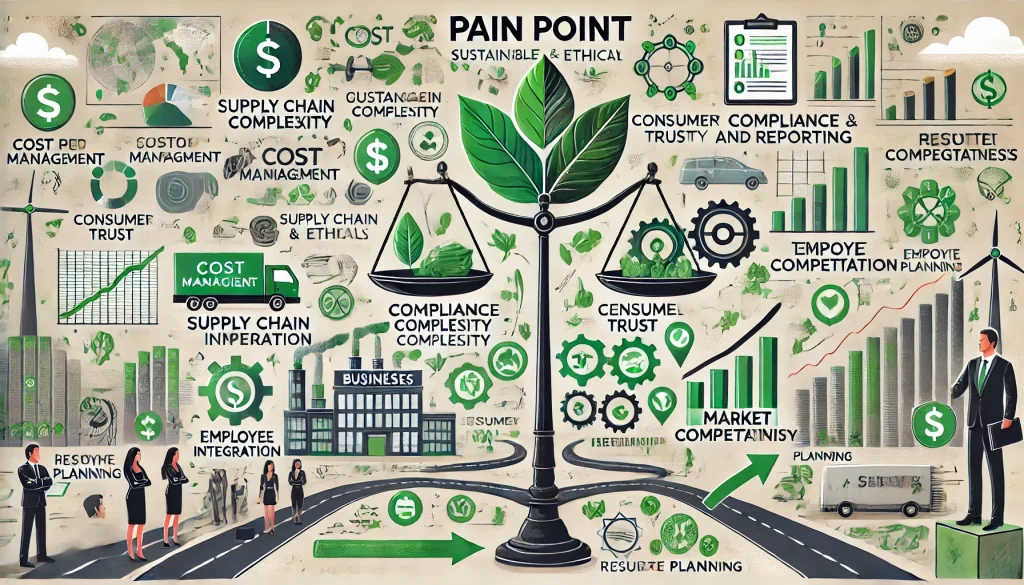Problem Statement :
Consumers today are increasingly demanding that businesses take responsibility for their environmental and social impact. This responsibility includes sustainable sourcing, ethical labor practices, and reducing carbon footprints. However, integrating these practices into business operations without significantly increasing costs or compromising profitability is a major challenge. Balancing consumer expectations with financial performance requires innovative solutions and a commitment to corporate social responsibility (CSR). Businesses must find ways to adopt sustainable and ethical practices that align with their goals and values while ensuring they remain competitive and profitable. This balance involves strategic planning, investment in new technologies, and fostering a culture of sustainability within the organization. Our company aims to develop a comprehensive platform that enables businesses to seamlessly integrate sustainable and ethical practices into their operations, providing tools and resources to manage and report on their CSR activities effectively.
Pain Points :
- Cost Management: Balancing sustainability with cost-effectiveness.
- Supply Chain Complexity: Ensuring sustainable and ethical practices across all suppliers.
- Compliance and Reporting: Keeping up with evolving regulations and standards.
- Consumer Trust: Building and maintaining trust through transparency.
- Technological Integration: Implementing new technologies for sustainability without disrupting current operations.
- Employee Training: Educating staff on new practices and standards.
- Market Competitiveness: Maintaining a competitive edge while adopting CSR practices.
- Resource Allocation: Allocating sufficient resources to CSR initiatives without compromising other areas.
- Measurement and Verification: Accurately measuring and verifying the impact of CSR activities.
- Long-term Planning: Developing long-term strategies that incorporate sustainability and profitability.

Future Vision
Our platform aims to revolutionize how businesses integrate sustainable and ethical practices into their operations. Leveraging our strengths in data analytics and innovation, we will provide a comprehensive solution that ensures cost-effective implementation, enhanced supply chain transparency, simplified compliance, and robust consumer engagement. Our vision is to create a world where businesses can seamlessly balance profitability with a commitment to corporate social responsibility. We envision a future where our platform becomes the go-to tool for companies looking to meet and exceed their sustainability goals, driving positive environmental and social impact on a global scale.
The platform’s top use cases include supply chain transparency, enabling businesses to track and verify sustainability across their supply chains using blockchain technology; compliance management with automated tools to help businesses stay compliant with global CSR regulations; and advanced analytics and reporting features for measuring and reporting CSR activities. Additionally, the platform will provide tools for effective consumer communication, allowing businesses to transparently share their sustainability efforts. Other key features include carbon footprint management to track and reduce emissions, monitoring and ensuring ethical labor practices, resource optimization tools to reduce waste, employee engagement features to involve staff in sustainability initiatives, and detailed investor reporting on CSR activities. The platform will also support sustainable product development, helping businesses create and market environmentally friendly products.
Our target users are mid-to-large scale businesses across various industries, primarily company leadership and management teams aged 35-55. The platform will be used regularly to manage and report CSR activities, with key stakeholders accessing it daily to monitor progress, compliance, and impact. The stakeholders include company executives responsible for overall strategy and profitability, sustainability officers tasked with implementing and managing CSR initiatives, employees affected by changes in labor practices, consumers demanding transparency and ethical practices, investors interested in long-term profitability and sustainability, suppliers required to adhere to new sustainable sourcing standards, regulatory bodies ensuring compliance, and NGOs and advocacy groups monitoring corporate practices.
Key competitors in this domain include Salesforce, SAP, Microsoft, IBM, and Oracle, all providing various sustainability management solutions. Notable startups such as EcoVadis, Climeworks, Sourcemap, GHG Sat, and Measurabl are also actively working towards solving these challenges. Innovations in the industry include blockchain for supply chain transparency, AI-driven sustainability reporting, carbon capture technologies, IoT for environmental monitoring, and sustainable packaging solutions. Recent investments in this area are substantial, with EcoVadis raising $500 million in January 2023 and Climeworks securing $600 million in April 2023, among others. The market for CSR and sustainability solutions is growing rapidly, driven by consumer demand and regulatory pressures, with significant room for innovation, particularly in supply chain transparency and carbon capture technologies.
Use Cases
Use Cases for EcoPlatform
1. Supply Chain Transparency: Businesses can track and verify the sustainability of their supply chains using blockchain technology integrated into EcoPlatform. This ensures ethical sourcing and full visibility into the origin and journey of products, helping businesses to maintain high standards of accountability.
2. Compliance Management: EcoPlatform offers automated tools to help businesses stay compliant with global CSR regulations. The platform continuously updates with the latest regulatory requirements, simplifying the process of adhering to environmental and labor laws across different regions.
3. Sustainability Reporting: Advanced analytics and reporting features on EcoPlatform allow businesses to measure and report on their CSR activities accurately. These detailed reports can be customized for internal stakeholders and external parties, including consumers and regulatory bodies.
4. Consumer Communication: EcoPlatform provides businesses with tools to effectively communicate their sustainability efforts to consumers. Features include customizable dashboards and social media integration, enabling transparent and engaging storytelling about the company’s environmental and social initiatives.
5. Carbon Footprint Management: The platform includes features to track and reduce carbon emissions. Businesses can set carbon reduction targets, monitor progress in real-time, and implement strategies to lower their overall carbon footprint, contributing to global climate goals.
6. Ethical Labor Practices: EcoPlatform allows businesses to monitor and ensure ethical labor practices across all operations. This includes auditing supplier practices, tracking working conditions, and ensuring compliance with labor laws and ethical standards.
7. Resource Optimization: EcoPlatform offers tools to optimize resource usage and reduce waste. By analyzing consumption patterns and providing actionable insights, businesses can implement more efficient practices, saving costs and reducing environmental impact.
8. Employee Engagement: The platform features modules to engage employees in sustainability initiatives. This includes educational resources, sustainability challenges, and recognition programs to motivate and involve staff in the company’s CSR efforts.
9. Investor Reporting: EcoPlatform provides transparency and detailed reports for investors on CSR activities. Businesses can use these reports to showcase their commitment to sustainability, attract ethical investment, and fulfill ESG (Environmental, Social, Governance) criteria.
10. Sustainable Product Development: EcoPlatform helps businesses develop and market sustainable products. This includes tools for assessing the environmental impact of products, sourcing sustainable materials, and marketing products based on their sustainability credentials to appeal to conscious consumers.
Target Users and Stakeholders
Target Users:
- User: Mid-to-large scale businesses across various industries.
- Age group: Company leadership and management teams, typically aged 35-55.
- Gender: M/F
- Usage Pattern: These businesses will use the platform regularly to manage and report on their CSR activities, with key stakeholders accessing it daily to monitor progress, compliance, and impact.
- Benefit: The platform will enable businesses to integrate sustainable and ethical practices without significantly increasing costs, ensuring they meet consumer expectations and regulatory requirements while maintaining profitability.
Stakeholders:
- Company Executives: Responsible for overall strategy and profitability.
- Sustainability Officers: Tasked with implementing and managing CSR initiatives.
- Employees: Impacted by changes in labor practices and workplace standards.
- Consumers: Demand transparency and ethical practices.
- Investors: Interested in the long-term profitability and sustainability of the company.
- Suppliers: Required to adhere to new sustainable sourcing standards.
- Regulatory Bodies: Ensure compliance with environmental and labor laws.
- NGOs and Advocacy Groups: Monitor and report on corporate practices.
Research Competition
Competitors: Top 5 companies actively working on solving the pain points discussed.
Products/Services: Solutions available that address these pain points.
Startups: Top 10 startups working towards solving these pain points.
Innovation: Top 10 innovations in the industry for solving the problems.
Investment: Recent investment decisions, including exact numbers, dates, and companies involved.
Gaps: Evaluation of whether available products and services fulfill the needs of the target users.
Competitors
- Salesforce: Provides cloud-based CRM platforms with sustainability tools to track and report CSR initiatives.
- SAP: Offers sustainability management solutions integrated into their ERP systems for comprehensive CSR tracking.
- Microsoft: Azure provides cloud solutions for sustainability reporting and carbon footprint management.
- IBM: Utilizes AI and blockchain for supply chain transparency and sustainability reporting.
- Oracle: Offers cloud-based solutions for managing sustainability and CSR efforts within business operations.
Products/Services
- Salesforce Sustainability Cloud: Tracks environmental impact and manages sustainability data.
- SAP EHS Management: Environmental, health, and safety management solutions for businesses.
- Microsoft Azure Sustainability: Tools and services to reduce environmental impact.
- IBM Environmental Intelligence Suite: AI-driven insights for environmental risk management.
- Oracle Sustainability Solutions: Cloud services for managing sustainability performance.
Startups
- EcoVadis: Provides sustainability ratings and performance improvement tools for global supply chains.
- Climeworks: Specializes in direct air capture technology to remove CO2 from the atmosphere.
- Sourcemap: Offers supply chain transparency solutions to trace the origin of products.
- GHG Sat: Monitors greenhouse gas emissions from space for better environmental data.
- Measurabl: Provides ESG (Environmental, Social, Governance) data management solutions.
- Too Good To Go: Focuses on reducing food waste through a marketplace for surplus food.
- Planetly: Carbon management platform to help companies measure and reduce their carbon footprint.
- Good On You: Rates fashion brands based on their sustainability and ethical practices.
- Ethical Angel: Platform connecting companies with CSR opportunities and resources.
- Circular IQ: Helps companies measure and improve circular economy performance.
Innovations
- Blockchain for Supply Chain Transparency: Ensures ethical sourcing and traceability.
- AI-driven Sustainability Reporting: Automated data collection and reporting.
- Carbon Capture Technologies: Innovative methods to capture and store CO2 emissions.
- IoT for Environmental Monitoring: Real-time data collection on environmental impact.
- Green Cloud Computing: Energy-efficient data centers and cloud services.
- Circular Economy Models: Designing products for reuse and recycling.
- Sustainable Packaging: Innovations in biodegradable and recyclable materials.
- Renewable Energy Solutions: Advancements in solar, wind, and other renewable sources.
- Water Conservation Technologies: Efficient water usage and recycling solutions.
- Sustainable Agriculture Practices: Innovations in farming to reduce environmental impact.
Investment
- EcoVadis: Raised $500 million in Series C funding in January 2023.
- Climeworks: Secured $600 million in funding in April 2023 for carbon capture technology.
- Planetly: Received $150 million in Series B funding in February 2023.
- Measurabl: Closed a $100 million funding round in March 2023.
- Too Good To Go: Raised $100 million in Series D funding in June 2023.
Market Maturity
The market for CSR and sustainability solutions is growing rapidly, driven by increasing consumer demand and regulatory pressures. While there are mature solutions available from major companies like Salesforce, SAP, and Microsoft, there is still room for innovation, especially in areas like blockchain for supply chain transparency and carbon capture technologies. Startups are playing a crucial role in driving these innovations forward.
Summary
EcoPlatform is designed to revolutionize how businesses integrate sustainable and ethical practices into their operations. In response to increasing consumer demands for environmental responsibility and social impact, EcoPlatform offers a comprehensive solution that enables businesses to adopt sustainable practices without significantly increasing costs or compromising profitability. Our platform leverages strengths in data analytics and innovation to provide cost-effective implementation, enhanced supply chain transparency, simplified compliance, and robust consumer engagement.
Key features of EcoPlatform include supply chain transparency through blockchain technology, automated compliance management tools, advanced analytics and reporting for CSR activities, and consumer communication features to transparently share sustainability efforts. The platform also offers carbon footprint management, ethical labor practices monitoring, resource optimization, employee engagement modules, investor reporting, and sustainable product development tools.
Target users for EcoPlatform are mid-to-large scale businesses across various industries, particularly company leadership and management teams aged 35-55. The platform will be used regularly to manage and report CSR activities, with key stakeholders including company executives, sustainability officers, employees, consumers, investors, suppliers, regulatory bodies, and NGOs.
The competitive landscape includes major players like Salesforce, SAP, Microsoft, IBM, and Oracle, along with innovative startups such as EcoVadis, Climeworks, Sourcemap, GHG Sat, and Measurabl. These companies are actively working on solutions to the pain points of integrating sustainable practices, such as cost management, supply chain complexity, and compliance requirements. Innovations in the industry include blockchain for supply chain transparency, AI-driven sustainability reporting, carbon capture technologies, and sustainable packaging solutions.
Recent investments in the CSR and sustainability sector highlight the growing market potential, with significant funding rounds for companies like EcoVadis and Climeworks. The market for sustainability solutions is rapidly maturing, driven by consumer demand and regulatory pressures, with ample opportunities for innovation.
EcoPlatform’s projected revenue growth reflects its potential impact, starting at $10 million in the first year and reaching $75 million by the fifth year. The platform’s most optimistic launch date is Q3 2025, positioning it to become the go-to tool for businesses looking to meet and exceed their sustainability goals, driving positive environmental and social impact on a global scale.


